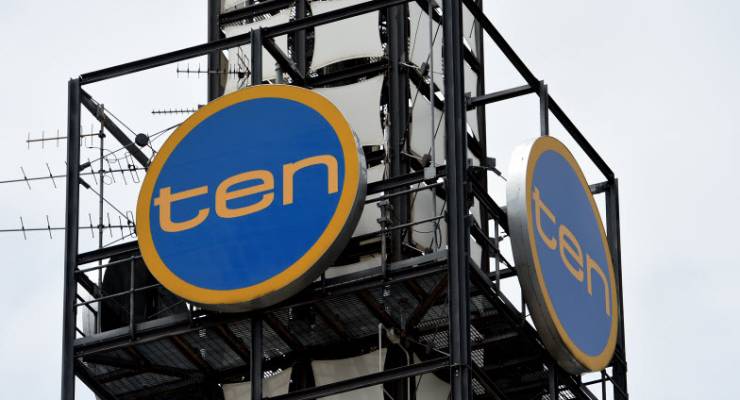
The board of the embattled Ten Network has met again today, and the company is being put into voluntary administration. There won’t be a rose-coloured view of how Ten got to this position on the conflicted five-person board (with only two independent directors). In a moment’s candour all would agree the problems go back years.
In a statement to the ASX just after 11.30am, Ten directors announced the decision and said Korda Mentha, the Melbourne-based accounting group had been appointed as voluntary administrators of the company and each of its subsidiaries.
Following yesterday’s trading halt, The Australian today has tried to place blame for the company’s woes in the hands of an old Murdoch foe, Fairfax Media chair Nick Falloon (who was chair of Ten in the late noughties), saying he “saddled Ten with unsustainable costs”. The reality is very different.
In 2009-10, the year before Lachlan Murdoch took over, Ten had revenues of $991 million (which included its Eye outdoor business) and earnings before interest, tax, depreciation and amortisation (EBITDA) of $208.1 million. In 2013-14, when Lachlan Murdoch quit (in March 2014, just after the February half-year balance date), Ten reported revenue of $661 million (lower because of the sale of the outdoor business as well as the slide in ratings and TV revenues), and the network made a loss of $168 million, including $58 million in one-offs. The EBITDA loss was $79.3 million.
Ten collapsed into administration after nearly seven years of poor management decision-making, conflicts of interest, weak programming decisions and the downturn in ad revenue growth for all legacy media (thanks to the rise in social media such as Facebook). Fingers may well be pointed four billionaire shareholders: James Packer, Lachlan Murdoch, Gina Rinehart and Bruce Gordon.
They combined to force out the then-Ten chair Falloon (who was a former CEO of PBL, flicked by Kerry and James Packer in 2001) and CEO Grant Blackley. Falloon and Blackley had made costly moves to attract a broader range of viewers in the 25-to-54 group through more news, sport and general programming, rather than shows skewing towards Ten’s long-time 18- to 39-year-old demographic, which was deserting TV for social media. There followed years of interference. People in TV still remember some of Murdoch’s programming gems, such as So You Think You Can Dance Australia, with wife Sarah as host.
Ten had four CEOs in seven years, so we also saw mass confusion. Lachlan Murdoch was first, before he became the executive chairman for two years, followed by James Warburton, Hamish McLennan and Paul Anderson. All were approved by Murdoch and the board, which included his personal representative Siobahn McKenna from 2012. She quit the Ten board in March this year without explanation and was found a safe job at News Corp, overseeing its pay TV interests.
Of the quartet of billionaires, Murdoch was the one who was more involved in management and strategy. He became the interim CEO in 2010 and was chair until he bolted in March 2014, returning to the family home as co-chair of News Corp and executive co-chair (with dad Rupert in both cases) of 21st Century Fox, unstained by ruining an Australian TV network.
But Lachlan Murdoch’s real legacy was to be found deep in Ten’s balance sheet and the $440 million fall in the value of the company’s TV licences from 2009-10 (the year before he took over as interim CEO) and 2013-14 (the year he left) — from $1.172 billion to $732 million, a fall of 37%. That’s what you call building value. That figure at February 28 this year was just $132 million. In other words, the billionaires, led by Murdoch, have helped blow up more than a billion dollars in balance sheet value at Ten.
Administration will allow Ten to restructure program supply agreements with CBS (the most onerous being based on profit share from Ten’s ONE and Eleven digital channels) and with 21st Century Fox. Production deals with other suppliers, such as Endermol Shine (50% owned by 21st Century Fox) and Fox Sports (100% owned by News Corp) will remain in place.








I told him not to play with Rupert……
Interesting, several billionaires kept Ten afloat while lobbyists worked on getting the ownership rules changed, so now having pulled their support, Murdoch only has to wait for receivership to pick the whole thing up for a song. They all gain by having an ultra right, pro-corporate propaganda mouthpiece not just in print and radio, but now in free to air TV as well.
My bad, just heard on news that the ownership rules haven’t changed yet, but I don’t doubt that with this sycophantic lot it will happen.
Yes the goss is that the Billionairses half brought the food and prospective team leaders as a plethintic
And lo, it came to pass. Murdoch is now in control of Ten.
Great, Sky and Faux News on terrestrial TV, just what this democracy needs.
The final nail?
A veritable “Blot on the Political Landscape” – serving Limited News Party ends.
How to wreck a business, or lose some of daddy’s money in investing in others – let lachlan ‘lucky sperm’ murdoch have a go.